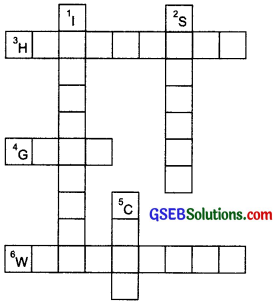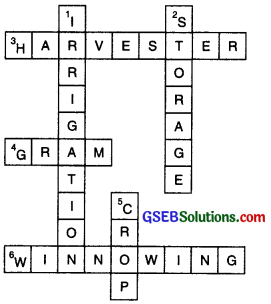Gujarat Board GSEB Textbook Solutions Class 8 Science Chapter 1 Crop Production and Management Textbook Questions and Answers,Notes Pdf.
Gujarat Board Textbook Solutions Class 8 Science Chapter 1 Crop Production and Management
Gujarat Board Class 8 Science Crop Production and Management Textbook Questions and Answers
![]()
Question 1.
Select the correct word from the following list and fill in the blanks, float, water, crop, nutrients, preparation
(а) The same kind of plants grown and cultivated on a large scale at a place is called _______.
(b) The first step before growing crops is _______ of the soil.
(c) Damaged seeds would _______ on top of water.
(d) For growing a crop, sufficient sun-light, _______ and _______ from the soil are essential.
Answer:
(a) crop
(b) preparation
(c) float
(d) water, nutrients
Question 2.
Match items in Column A with those in Column B.

Answer:

Question 3.
Give two examples of each: in the soil that increases crop yields.
(a) Kharif crop
(b) Rabi crop
Answer:
(a) Paddy and maize.
(b) Wheat and gram.
Question 4.
Write a paragraph in your own words on each of the following:
(a) Preparation of soil
(b) Sowing
(c) Weeding
(d) Threshing
Answer:
(a) Preparation of soil: Soil is prepared before sowing the seeds. The soil is loosened to increase the absorption of water and manure. Loosening of soil Particles adds humus and nutrients in the soil that increases crop yields Tilling or loosening the soil is done by plough which is pulled by a pair of bulls. Tractor driven cultivators are also used to loosen the soil.
(b) Sowing: After preparation of soil, it is ready for sowing of seeds. Healthy and clean seeds should be selected. Sowing is done by seed drill or funnel shaped tools. Seed drill is a modern instruments which can sow seeds at proper depth and distance.
(c) Weeding: The unwanted plants that grow along with the crops are called weeds. They hinder the growth of plant, by absorbing nutrients from the soil. Thus, it is necessary to remove them, otherwise, they may make the soil nutrient deficient. Process of removing weeds is called weeding. It can be done manually or by mechanical tools. Some chemicals like 2, 4-D can also be used.
(d) Threshing: Separation of grains from the chaff is called threshing. When the crop mature, it is harvested, and cut along with the stalks. Grains are then, separated from the chaff using a winnowing machine.
![]()
Question 5.
Explain how fertilisers are different from manure.
Answer:
- Manures are organic substances while fertilisers are chemical substances.
- Manures are prepared in fields, while fertilisers are prepared in factories.
- Manures contain all the nutrients, while fertilisers are rich in certain nutrients.
- Manures provide humus, while fertilisers do not provide it.
Question 6.
What is irrigation? Describe two methods of irrigation which conserve water.
Answer:
The process of watering crop plants is called irrigation.
Two methods of irrigation are:
(i) Sprinkler: Sprinklers work as fountains. It has long perpendicular pipes, having holes at regular distances. When water is supplied, it comes out of the holes and sprinkled in the field. These holes have rotating nozzles which sprinkle water in all directions. It controls the wastage of water.
(ii) Drip System: This system also conserve water, as it allows water to flow drop by drop directly near the roots of the plants. It is the best technique for watering fruit plants, in gardens and trees. Water is not wasted at all in this method.
Question 7.
If wheat is sown in the kharif season, what would happen? Discuss.
Answer:
Wheat does not require huge amount of water for growth. In contrary to it; in kharif season, rains are very frequent. So, wheat should not be grown in kharif season, otherwise, excess water may destroy the crop.
Question 8.
Explain how soil gets affected by the continuous plantation of crops in a field.
Answer:
Plantation of crops in a field, continuously for many years can make the soil infertile as soil lose its nutrients does not get the time to replenish them. Thus, it makes
Question 9.
What are weeds? How can we control them?
Answer:
Weeds are unwanted plants. They grow along with crops. They compete for nutrients and water with the main crop. Process of controlling growth of weeds is called weeding. Weeding is done manually by using khurpi and by using mechanical machines. Weeds can also controlled by using some chemical substances like 2, 4-D. These chemicals are called weedicides and used to kill and destroy the weeds.
Question 10.
Arrange the following boxes in proper order to make a flow chart of sugarcane crop production.

Answer:

Question 11.
Complete the following word puzzle with the help of clues given below.
Down (↓)
1. Providing water to the crops.
2. Keeping crop grains for a long time under proper conditions.
5. Certain plants of the same kind grown on a large scale.

Across (→)
3. A machine used for cutting the matured crop.
4. A rabi crop that is also one of the pulses.
6. A process of separating the grains from chaff.
Answer:
